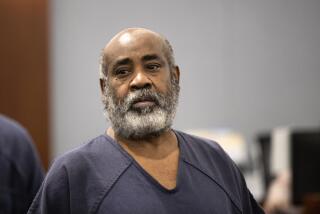Judge Rejects Bid for Tapes in Slave Case : Courts: Federal prosecutors wanted 63 migrant workers to testify on videotape from Mexico City. A Somis flower rancher is accused of forcing them to work for about $1 an hour on his 50-acre compound.
- Share via
A federal judge Monday denied an extraordinary government request that 63 witnesses in the slavery trial of Somis flower rancher Edwin M. Ives be allowed to testify on videotape in Mexico City about their experiences at Ives’ compound during the 1980s.
However, U.S. District Judge Consuelo B. Marshall said that if federal prosecutors build a stronger case for the out-of-court testimony, she would reconsider her decision later this month. They said they would try.
Assistant U.S. Atty. Carol Gillam argued that because the 63 witnesses are migrant laborers and are reluctant to testify, they should be questioned under oath--and their testimony videotaped--before the government loses track of them.
But Marshall said that because witnesses were not specifically asked if they would come to Los Angeles for Ives’ trial in March, she could not conclude that they would not appear. Videotaped testimony cannot be allowed, she said, unless there is no other way to present important evidence to a jury.
The witnesses, the judge said, had come to the United States at least once before to work for Ives, “so if they came voluntarily then, they might be willing to come here again.”
The government would pay all expenses and a subsistence wage to the witnesses while in the United States, she said.
Gillam argued that the videotaped testimony is critical to her case and that her inability to subpoena witnesses in Mexico gives her no other way of guaranteeing that a jury will hear it.
“There would be some number that would agree to come, but I can’t say how many,” Gillam told the judge.
The prosecutor said that about 40 of the 63 witnesses have unique stories about “medical conditions that were not attended to, beatings, threats” at the Ives ranch that cannot be duplicated by other witnesses.
The witnesses, who are mostly Zapotec and Mixtec Indians, live in villages so rural that Spanish is a second language, attorneys have said.
Prosecutors allege that the laborers were smuggled to Ives’ 50-acre Somis compound during the 1980s, forced to work for about $1 an hour and to buy food and sundries at inflated prices from a company store. Ives, 54, six ranch overseers and an alleged smuggler are all charged in a 15-count indictment alleging civil rights and labor violations.
The government’s request for the videotaped testimony of 63 witnesses is unprecedented, Gillam said. Such testimony, called criminal depositions, is rare even when only one or two witnesses are involved.
“Obviously, nothing on this scale has been done before,” she said. Yet, there has never been a U.S. slavery case like the Ives prosecution, she said. “These things have never been charged before.”
Robert M. Talcott, one of seven defense attorneys at the hearing, said of Gillam’s motion:
“Basically, the government wants to try this case in Mexico . . . without any of the safeguards we use in this country. . . . They want to transfer the substance of the trial outside of the United States.”
If witnesses at the depositions had lied, no perjury charges could have been brought against them, because they would not have been within the jurisdiction of a federal court, he said.
Many of the witnesses Gillam proposed calling in Mexico are also listed as defense witnesses, Talcott has said. And in interviews with his investigators, the witnesses support Ives’ contention that he has done nothing wrong, the lawyer said.
Attorney Janet I. Levine, who represents former ranch foreman Rony Havive, argued in the defense’s primary written argument that approving the Mexico City testimony would be creating a “trial by deposition” that would require at least one attorney for each defendant to move to Mexico for two months.
“These witnesses are the whole case,” Levine said.
She said such videotaped testimony should be allowed only in the most extraordinary cases, such as when witnesses are imprisoned in a foreign country.
As proposed by Gillam, testimony in Mexico City would have been given before two cameras, with both prosecutors and defense attorneys allowed to be present.
More to Read
Sign up for Essential California
The most important California stories and recommendations in your inbox every morning.
You may occasionally receive promotional content from the Los Angeles Times.










